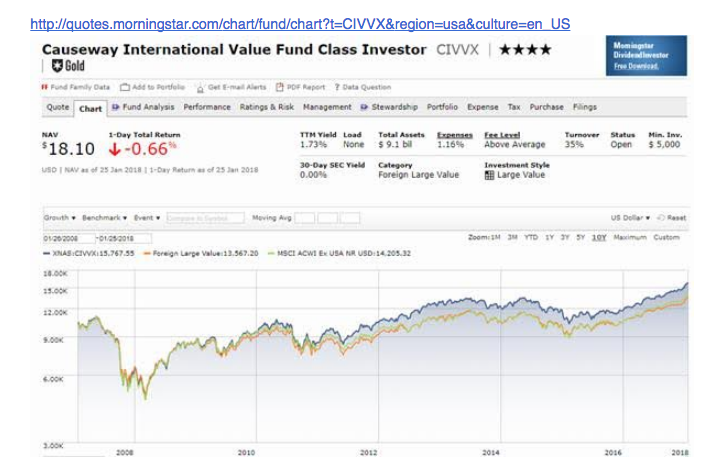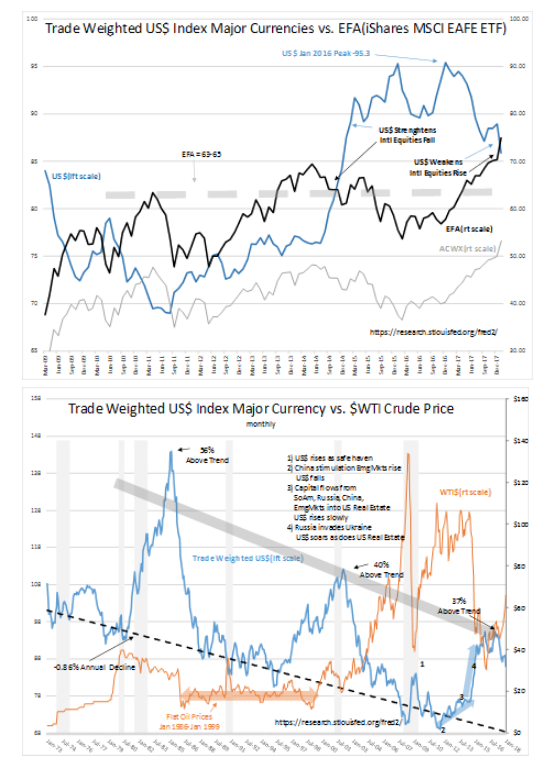The (US dollar) has been much in the news. How it is priced in the context of global currencies impacts investors in every country as it impacts trade flows, commodity prices and relative prices of global assets and underlying returns. The current discussion of a weakening US dollar as somehow being ‘bad for investing’ misunderstands the role of the US dollar and its long-term global relationships. The Trade Weighted US dollar Index Major Currencies is shown from Jan 2009 vs. iShares MSCI EAFE (NYSE:EFA) (Large Cap international equities ETF) and iShares MSCI ACWI ex US (NASDAQ:ACWX) (All World ex-US equities ETF) and shown from Jan 1973 vs WTI (West Texas Crude Oil Price). Accompanying these US dollar charts is the Morningstar chart of Causeway International Value Inv, a Gold rated 4-Star international mutual fund which just received Morningstar’s international Manager of the Year as an example for the US dollar impact on investors.


The current relationship between the US dollar and international equities and commodities is fairly simple. If the US dollar rises, commodity and international equity prices fall. If the US dollar declines, commodity and international equity prices rise. This inverse relationship has been more prominent since 2003 with computer-driven algorithmic trading. The rapid shifts today come from this source of activity. Economic decisions based on currency fluctuations occur over years not hours. The US dollar has been in a long-term declining trend since 1973 of 0.86% as the US increases global trade which raises the currencies of Emerging/Developing Markets over time. Periodically the US dollar sees bouts of strength tied to investors pooling capital in the US or US dollar priced assets. This occurred during the high interest rate period of the early 1980s, during the Internet Bubble and recently 2014-2016. While the two earlier instances can be tied to investors seeking higher returns, the 2014-2016 can be tied to investors seeking a safe-haven from uncertainty caused by Russia’s invasion of Ukraine, the rise of ISIS and terrorism supported by Iran and North Korea. As this uncertainty lessens, capital is being repatriated to Emerging/Developing Markets and the US dollar declines.
A strong US dollar disrupts high-value US dollar exports. The many US manufacturing jobs lost overseas from have always occurred during strong US dollar periods. Every strong US dollar period has also caused US Industrial Recessions even during general economic expansions. Most investors have not been aware of this impact because they enjoyed a rising economy during a period of falling commodity prices. It seemed the best of both worlds, but for commodity producers and exporters it was not so! A weakening US dollar makes the US more trade competitive and raises commodity prices which benefits agriculture, mining, energy and general industry.
The impact for international equities has some similarity to commodities. A weakening US dollar results in higher prices for international equities. The EFA & ACWX ETFs and Causeway international chart reflect this impact. international equities have an additional benefit in the fact that a weakening US dollar also means capital is flowing back to international economies which stimulates additional economic growth and higher international equity prices. The benefit for US exporters as the US dollar normalizes to its long-term trend is strong economic growth in the US Industrial sector and favorable currency exchange. Global corporate earnings accelerate as does global employment. A weakening US dollar at this point in the economic cycle has benefits for all markets.
The Investment Thesis:
Predicting changes in US dollar relative valuation to global currencies has always proven impossible because the reasons for periods of strength have never repeated identical criteria. Nonetheless, history shows that the US dollar returns to its long-term trend over time and that normalization has predictability and is investable. Today, the US dollar is in the process of normalization which provides specific investment opportunities in US Industry, commodity related companies and international equities.
To see more posts on any of the companies mentioned in this article, enter their stock ticker symbol in the search box.
The information in this blog post represents my own opinions and does not contain a recommendation for any particular security or investment. I or my affiliates may hold positions or other interests in securities mentioned in the Blog, please see my Disclaimer page for my full disclaimer.